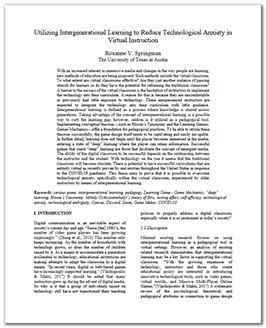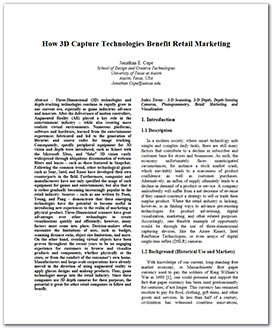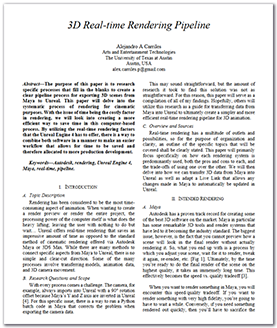Research Statement
 My earliest research focused on the design and development of virtual and immersive experiences. Several of my research projects have resulted in publications, grants, and conference presentations.
My earliest research focused on the design and development of virtual and immersive experiences. Several of my research projects have resulted in publications, grants, and conference presentations.
I first became interested in research in 2013 while working on my Master’s degree at Carnegie Mellon’s Entertainment Technology Center. I worked on a semester-long project with 7 other students, a faculty advisor, and a mentor from the Telemedicine and Advanced Technology Research Center. This project was funded by the U.S. military with the goal of exploring how biometric data can be used to improve the exergaming experience.
The project resulted in my first conference presentation at Games for Health, and my first journal publication in the Institute of Electrical and Electronics Engineers (IEEE). Our published research shows how we used the players’ heart rates in the gameplay to engage the players while they exercised.
 In 2019 I was a Co-PI for a grant-funded research project through the University of Texas’ Planet Texas 2050 research initiative. I worked alongside a PI and a second Co-PI, and we had two PhD students and three undergrads working on this project. I supervised our three undergraduate research assistants with the design and technical development of the project.
In 2019 I was a Co-PI for a grant-funded research project through the University of Texas’ Planet Texas 2050 research initiative. I worked alongside a PI and a second Co-PI, and we had two PhD students and three undergrads working on this project. I supervised our three undergraduate research assistants with the design and technical development of the project.
This project focused on using the climate and population data generated by other PT 2050 teams, and turned it into an immersive VR experience to engage the public.
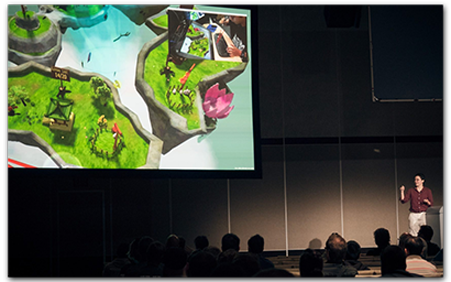 All of my research utilizes technical and design skills to create immersive experiences. Currently I'm interested in research that combines those skills with my passion for teaching, and exploring how immersive technology can empower educators and improve efficiency while making learning more meaningful for students.
All of my research utilizes technical and design skills to create immersive experiences. Currently I'm interested in research that combines those skills with my passion for teaching, and exploring how immersive technology can empower educators and improve efficiency while making learning more meaningful for students.
I hope to pursue this research in human-computer interaction in the subfield of computer-mediated learning. I believe that data tracked by computers through our interactions can be used to customize and individualize a user's experience.
Projects
Texas Immersive Institute, 2022-Present
I am currently a Senior Fellow in the Texas Immersive Institute contributing to both applied and theoretical research projects, including a project called Space Shapers about Media Literacy, and an in-progress research publication about Virtual Beings based on our recent Think & Do Symposium.
VR Futures, 2019-2021
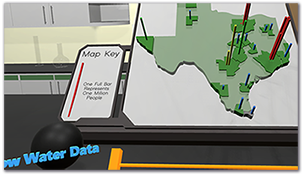 I served as Co-PI on this grant-funded project, which focused on developing an immersive VR experience in collaboration with other PT 2050 research teams. We presented our work at the Planet Texas 2050 Research Showcase and it was accepted to the Texas Resilience Conference. You can download and play VR Futures for yourself.
I served as Co-PI on this grant-funded project, which focused on developing an immersive VR experience in collaboration with other PT 2050 research teams. We presented our work at the Planet Texas 2050 Research Showcase and it was accepted to the Texas Resilience Conference. You can download and play VR Futures for yourself.
I've also written about our research in an article titled The Transformative Power of Games which was published in the Journal of Design and Creative Technologies.
Webz of War, 2013
This semester-long research project was funded by the U.S. Military and the Telemedicine and Advanced Technology Research Center. I was the lead designer on the project, and we were tasked with exploring the use of biometric data in exergames.
We built a 2-player game that used a Kinect, two Wii Fit Balance Boards, and two Polar Heart Monitors. The game involves leaning side to side to steer a hoverboard, and punching to shoot plasma projectiles at giant robot spiders.
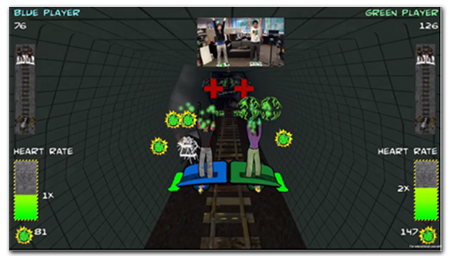
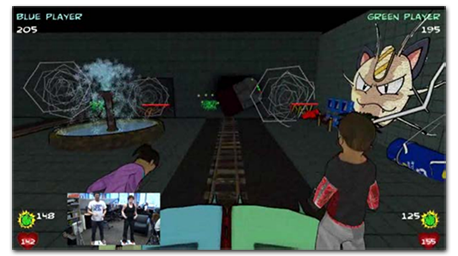
The heart rate monitors take a base-level heart rate at the start and then track the player’s heart rate as it goes up and down throughout the experience. We translate increases in heart rate to stronger plasma projectiles, meaning putting more effort into the exercise results in more excitement and satisfaction in the game.
We studied the results using data collected from the heart monitors and surveys of the players. Our results were published by IEEE and presented at Games for Health in Boston 2013.
Non-Human Behavior AI, 2017
This independent project was inspired by my interest in how non-human life forms behave and interact in nature. I decided to explore how this behavior could be used in game design to make more interesting AI for non-human characters.
Games are not limited by the constraints of reality, but often when designing creatures in games we default to very human-like behavior. Even when we move away from humans, we still tend to stick to creatures we understand well, mostly mammals.
In my research I took inspiration from insects, plants, fish, and even fungus. I presented on this topic at PAX Dev 2017 and at the Montreal International Games Summit 2017, as well as writing about it in my development blog.
Student-Centered Learning: A Culmination of the 7 Affordances
In the summer of 2020 I enrolled in several online courses to learn more about teaching online. I pursued this topic due to the pandemic forcing all of my classes to abruptly transition online, with the intent of improving my ability to teach my new online classes.
One of these online courses was e-Learning Ecologies offered by the University of Illinois. In this course I had a final research project to explore more deeply one of the topics presented in the course.
The topic I chose was Student-Centered Learning, and not only did I complete my research paper on this topic, I also incorporated it into a full redesign of the courses I teach.
Though my research paper is unpublished, you can read a draft copy of Student-Centered Learning: A Culmination of the 7 Affordances.
Mentorship of Undergraduate Student Research
In my work on the VR Futures research project, I supervise our 3 undergraduate research assistants. At the start of the project, I vetted prospective research assistants, and hired the 3 best candidates. I help them through technical and creative challenges, provide feedback, and offer support, as well as ensuring they are paid for their work.
I also mentor independent student research projects. As the Undergraduate Honors Advisor for my department, I oversee and mentor the Honors Thesis research projects our senior honors students undertake. I teach the Research Methods course in their junior year to prepare them for the Honors Thesis, and I review and critique their writing and research along the way.
The first three honors students completed their theses in Fall 2020, and all three submitted their finished papers to peer-reviewed journals to be considered for publication. Below are samples from each of their papers.
Other projects I mentor are less focused on writing and more focused on creating interactive media projects for applied research. I serve on the Faculty Panel for the Bridging Disciplines Program, which encourages students to take on creative projects across multiple fields. I have supervised 9 BDP projects to date, all resulting in unique creations ranging from AR exibits to website resources for sustainable practices.
Conference Presentations
- Roundtable Leader, Student Networking Session, IndieCade 2019
- Speaker, “Non-Human Behavior AI” Montreal Int’l Games Summit 2017
- Panelist, “Improving Reality with Virtual Reality” Austin Game Conf. 2017
- Panel Moderator, “Weird Tech”, Unite Austin 2017
- Speaker, “Non-Human Behavior AI”, PAX Dev 2017
- Panelist, “Breaking into the Industry”, Classic Games Fest 2017
- Panelist, “Surviving as an Independent AAA Studio” SXSW 2017
- Featured Speaker, Unity Women in Gaming Austin 2016
- Speaker, “Technology and User Experience” Unite LA 2016
- Panel Moderator, “The Reality of Virtual Reality” PAX South 2016
- Panel Moderator, “The Reality of Virtual Reality” PAX West 2016
- Panelist, “The Current State of VR” Texas Women in Games 2016
- Speaker, “Creating Immersive Interfaces/Interactions” PDC 2017
- “Webz of War” Exergaming Research, Games for Health 2013
Unity's Unite LA Conference 2016:
Publications and Writing
Best Paper Award: M. J. Johns, Mário Escarce Junior, Alison Crosby, Yiyang Lu, Magy Seif El-Nasr, Edward F. Melcer, and Katherine Isbister. 2025. "Wildfire Games: A Community Approach to Designing Serious Games as Interventions for Wildfire Preparedness." Proc. ACM Hum.-Comput. Interact. 9, 6, Article GAMES006 (October 2025), 31 pages. https://doi.org/10.1145/3748601
M.J. Johns, Linda Hirsch, Yiyang Lu, Bridget Ho, Anna Toledo, Tristyn Lai, Krithik Dhandapani, Edward F. Melcer, and Katherine Isbister. 2025. "A Playful Wildfire Simulation System in Two Minigames." In Companion Proceedings of the Annual Symposium on Computer-Human Interaction in Play (CHI PLAY Companion '25). Association for Computing Machinery, New York, NY, USA, 245–252. https://doi.org/10.1145/3744736.3749192
Junior, Mario Escarce, MJ Johns, Shivam Shukla, Darian Lee, and Yiyang Lu. "Fostering Collaborative Knowledge-Building and Resilience Through Player Discourse in Serious." In Serious Games: 11th Joint International Conference, JCSG 2025, Lucerne, Switzerland, December 4–5, 2025, Proceedings, p. 121. Springer Nature, 2025.
M.J. Johns. 2025. "Building Resilience Through Community-Centered Gameful Design." In Companion Proceedings of the Annual Symposium on Computer-Human Interaction in Play (CHI PLAY Companion '25). Association for Computing Machinery, New York, NY, USA, 265–269. https://doi.org/10.1145/3744736.3749327
Linda Hirsch, Daeun Hwang, Mj Johns, and Katherine Isbister. 2025. "HCI for Climate Resilience: Developing an Individual and Community Focused Framework through a Grounded Theory Approach." In Proceedings of the 2025 ACM Designing Interactive Systems Conference (DIS '25). Association for Computing Machinery, New York, NY, USA, 1740–1757. https://doi.org/10.1145/3715336.3735695
MJ Johns, Yael Nidam, Mário Escarce Junior, Linda Hirsch, Yiyang Lu, Bridget Ho, Anna Toledo, Magy Seif El-Nasr, Stephen Collier, Edward F. Melcer, and Katherine Isbister. 2025. "Translating Social Dilemmas into Gameful Designs for Wildfire Resilience." In Proceedings of the Extended Abstracts of the CHI Conference on Human Factors in Computing Systems (CHI EA '25). Association for Computing Machinery, New York, NY, USA, Article 541, 1–9. https://doi.org/10.1145/3706599.3720171
Alison Crosby, MJ Johns, Katherine Isbister, and Sri Kurniawan. 2025. "Designing FEVR: a VR Game for Wildfire Evacuation Readiness." In Proceedings of the 20th International Conference on the Foundations of Digital Games (FDG '25). Association for Computing Machinery, New York, NY, USA, Article 51, 1–4. https://doi.org/10.1145/3723498.3723766
Johns, M. J., et al. "Participatory Design of a Serious Game to Improve Wildfire Preparedness with Community Residents and Experts." Extended Abstracts of the CHI Conference on Human Factors in Computing Systems. 2024. https://doi.org/10.1145/3613905.3650735
Johns, M. J., et al. "Info Overload: A Cooperative Evacuation Game." arXiv preprint arXiv:2407.09559 (2024). https://doi.org/10.48550/arXiv.2407.09559
Johns, M. J., Eunsol Sol Choi, and Derusha Baskaran. "DinAR: Augmenting Reality for Sustainable Dining." arXiv preprint arXiv:2404.13272 (2024). https://doi.org/10.48550/arXiv.2404.13272
Crosby, Alison, and M. J. Johns. "Supporting Wildfire Evacuation Preparedness through a Virtual Reality Simulation." Proceedings of the 30th ACM Symposium on Virtual Reality Software and Technology. 2024. https://doi.org/10.1145/3641825.3689521
JOHNS, MJ, and TYLER COLEMAN. "How an AI Generated Experience Impacts Negative Perceptions of AI." https://generativeaiandhci.github.io/papers/2024/genaichi2024_2.pdf
Johns, M. (2022). From Floundering to Flourishing in Large Enrollment Classes: Facilitating Semi-Automated Learning Communities and Peer-to-Peer Interactions. CG Scholar, EPSY 408 FA22. https://cgscholar.com/community/profiles/mjohns/publications/258296
Johns, M. (2022). Productive Struggle in Higher Education: With Particular Challenges for Large Enrollment Classes. CG Scholar, EPSY 408 FA22. https://cgscholar.com/community/profiles/mjohns/publications/257730
P. Navarro, M. Johns, et al., “Webz of War: A cooperative exergame driven by the heart,” 2013 IEEE International Games Innovation Conference (IGIC), Vancouver, BC, 2013, pp. 187-190, doi: 10.1109/IGIC.2013.6659125.
M. Johns, “The Transformative Power of Games,” 2020 Journal of Design and Creative Technologies
M. Johns, “User Experience in the High Tech Era,” 2019 Journal of Design and Creative Technologies
M. Johns, “Student-Centered Learning: A Culmination of the 7 Affordances,” unpublished
M. Johns, "Experience Design for Virtual Reality," unpublished
Development Blog: meganlaurajohns.blogspot.com
